EducationWorld India preschool rankings 2020-21
Because of Covid-19 complications, this year’s survey of the best preschools is restricted to six cities where there is greater awareness and appreciation of high-quality early childhood education, viz Delhi, Mumbai, Kolkata, Chennai, Bengaluru and Hyderabad – Dilip Thakore & Summiya Yasmeen
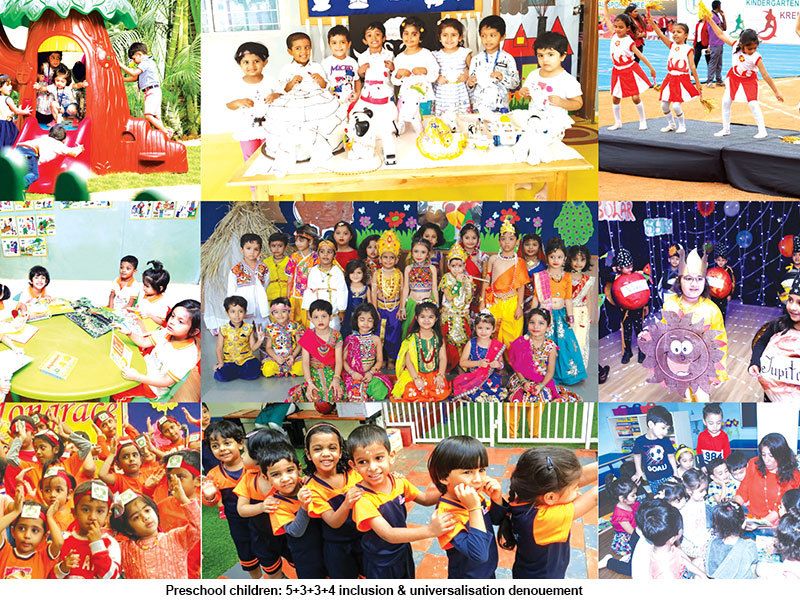
Over a decade ago in 2010 when there was minimal awareness of the vital importance of professionally administered early childhood care and education (ECCE), your editors conducted the first ever ratings and ranking of pre-primaries, aka preschools in the major cities of India. The rankings survey was followed by several seminars/conferences at which ECCE experts of international and national renown called attention to the crucial role of scientifically designed, play-based interactive curriculums and global best practices, and India’s most-reputed ECCE providers networked and exchanged notes.
Thus far this pioneer publication has conducted nine national surveys ranking of the most respected and admired preschools in 16 cities and towns of India. Moreover we have staged an equivalent number of national ECCE conferences at which hitherto totally ignored promoters, principals and teachers of top ranked preschools across the country were awarded and celebrated.
Please also note that since 2018 we have been rating, ranking and celebrating the country’s best government-promoted anganwadis — essentially nutrition centres for new-borns and lactating mothers that also provide a modicum of early childhood education. Currently there are 1.6 million anganwadis operational countrywide which provide basic ECCE to 85 million of the country’s 165 million children in the 0-6 age group. Thus for over a decade your editors have been championing the cause of universal professionally administered ECCE for youngest children.
Persistent championing of universal ECCE by your editors has paid off, even if belatedly. The new National Education Policy 2020 made public on July 29, accords heavy importance to professionally administered ECCE for infants. It proposes replacement of the current national 10+2 primary-secondary and higher secondary schools system with a 5+3+3+4 system incorporating five years of foundational education for all children in the 3-8 age group.
This means that three years of pre-primary education followed by two years of primary classes — hitherto entirely voluntary and provided to a small minority of children from middle and elite class households — will soon become compulsory and universal. With your editors repeatedly highlighting well-researched studies, particularly of Nobel laureate Dr. James Heckman to the effect that since children’s brains are 80 percent developed by age eight, and that a dollar invested in professionally provided ECCE is better spent than dollars later in the education continuum, the imminent switch to the 5+3+3+4 school system is likely to usher in a sea-change in Indian education resulting in markedly better learning outcomes in school and higher education.
Unfortunately because of the massive disruption caused within the education system by the raging Coronavirus pandemic which has prompted the Union and state governments to force closure of all education institutions — pre-primaries, schools, colleges and universities across the country have been shuttered since March 25 — and equal disruption in industry, business and the media, the EducationWorld calendar has also been disrupted. Thus far for the past ten years we have been publishing full-fledged EducationWorld India Preschool Rankings that rate and rank the best preschools in 16 cities/towns. However, because of the massive disruption this year we are obliged to publish a truncated version of the EW India Preschool Rankings in this issue.
“Because of Covid-19 complications, this year’s survey of the best preschools is restricted to six cities where there is greater awareness and appreciation of high-quality preschool education, viz, Delhi, Mumbai, Kolkata, Chennai, Bengaluru and Hyderabad. Our field personnel interviewed 1,459 sample respondents comprising SEC (socio-economic category) ‘A’ parents with at least one child in pre-primary education, principals and teachers of pre-primaries. Respondents were asked to rate the most-reputed preschools in their cities/towns on ten parameters of pre-primary education excellence including teacher welfare, leadership, teacher competence, curriculum and pedagogy, infrastructure, safety and hygiene and parental involvement, with varying weights. Moreover this year in light of the prolonged close-down of preschools since mid-March and children obliged to learn from home, we have added a new parameter, viz, online interaction with a weightage of 100,” says Premchand Palety, promoter-CEO of the Centre for Forecasting & Research (C fore, estb.2000), the highly-reputed market research and opinion polls company that has been partnering with EducationWorld to conduct the pioneer annual EW India Preschool Rankings since 2010.
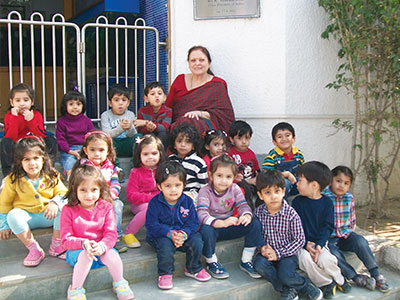 “We are very pleased to hear the good news that Magic Years is ranked Delhi’s #1 proprietary preschool again. This year we complete 45 years, and every year we have made a conscious effort to improve our early childhood education practices. During the past eight months of Covid-19 shutdown we have been working closely with our parents, to maintain learning continuity of children. We meet with all parents every month and present to them Montessori materials to enable children to learn at home. According to feedback from parents this system is much more successful than online classes. However, the big difficulty is that the Delhi education department has decreed that if a school is not holding online classes, it cannot charge fees. This has created great financial difficulties” — Shirley Madhavan Kutty, founder-principal of The Magic Years, Vasant Vihar, Delhi
“We are very pleased to hear the good news that Magic Years is ranked Delhi’s #1 proprietary preschool again. This year we complete 45 years, and every year we have made a conscious effort to improve our early childhood education practices. During the past eight months of Covid-19 shutdown we have been working closely with our parents, to maintain learning continuity of children. We meet with all parents every month and present to them Montessori materials to enable children to learn at home. According to feedback from parents this system is much more successful than online classes. However, the big difficulty is that the Delhi education department has decreed that if a school is not holding online classes, it cannot charge fees. This has created great financial difficulties” — Shirley Madhavan Kutty, founder-principal of The Magic Years, Vasant Vihar, Delhi
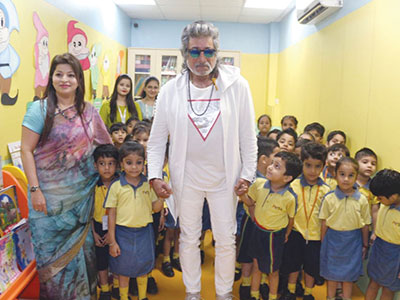 “Thank you for ranking our franchisee Petals, Dwarka, Sector 7 among the Top 5 preschools of Delhi. We are glad we have maintained our #5 ranking in these challenging pandemic times. Initially when we switched to online classes, it was difficult to convince parents about the efficacy of online interactions with youngest children. But through regular counseling and virtual orientation programmes we persuaded them about the value of limited two-way interaction between children and our highly trained teachers who have designed enjoyable curriculums for them. Moreover, we have provided our franchisees a blended learning model to transition tiny tots to online classes” — Preeti Kwatra (left), founder-chairperson of the Petals Group of preschools, Delhi
“Thank you for ranking our franchisee Petals, Dwarka, Sector 7 among the Top 5 preschools of Delhi. We are glad we have maintained our #5 ranking in these challenging pandemic times. Initially when we switched to online classes, it was difficult to convince parents about the efficacy of online interactions with youngest children. But through regular counseling and virtual orientation programmes we persuaded them about the value of limited two-way interaction between children and our highly trained teachers who have designed enjoyable curriculums for them. Moreover, we have provided our franchisees a blended learning model to transition tiny tots to online classes” — Preeti Kwatra (left), founder-chairperson of the Petals Group of preschools, Delhi
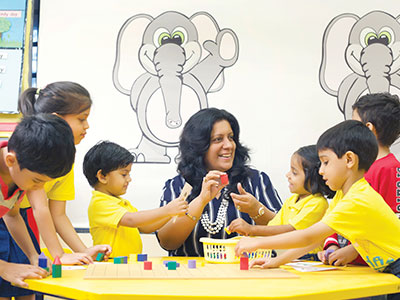 “The #1 in Mumbai rank of Podar Jumbo Kids, Khar is the best news we have received in this pandemic year. The entire team is elated that their hard work, creativity and parent outreach efforts have been recognised by your knowledgeable sample respondents. Our curriculum experts and teachers encouraged by a supportive management invested hundreds of hours in developing home-based virtual learning formats for youngest children to learn without the stress and anxiety associated with online learning. I salute and thank all teachers for continuing to provide meaningful foundational early childhood care and education during this difficult time” — Dr. Swati Popat Vats, president of the Podar Jumbo Kids (PJK) chain of 498 preschools with an enrolment of 45,000 children and 6,500 teachers across the country
“The #1 in Mumbai rank of Podar Jumbo Kids, Khar is the best news we have received in this pandemic year. The entire team is elated that their hard work, creativity and parent outreach efforts have been recognised by your knowledgeable sample respondents. Our curriculum experts and teachers encouraged by a supportive management invested hundreds of hours in developing home-based virtual learning formats for youngest children to learn without the stress and anxiety associated with online learning. I salute and thank all teachers for continuing to provide meaningful foundational early childhood care and education during this difficult time” — Dr. Swati Popat Vats, president of the Podar Jumbo Kids (PJK) chain of 498 preschools with an enrolment of 45,000 children and 6,500 teachers across the country
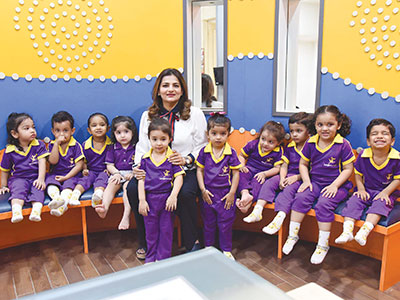 “I am delighted to learn that Kangaroo Kids, Chembur has been ranked Mumbai’s #1 franchised preschool for the fifth consecutive year. It’s very satisfying to receive this accolade in these difficult times of digital teaching-learning. At the start of the pandemic lockdown, most parents were skeptical about our being able to switch to virtual learning but with our two decades of experience and positive attitude, we have succeeded in providing age-appropriate foundational education to our children. We have received good feedback from parents and children about online interaction” — Reshma Kukreja, promoter franchisee of Kangaroo Kids, Chembur
“I am delighted to learn that Kangaroo Kids, Chembur has been ranked Mumbai’s #1 franchised preschool for the fifth consecutive year. It’s very satisfying to receive this accolade in these difficult times of digital teaching-learning. At the start of the pandemic lockdown, most parents were skeptical about our being able to switch to virtual learning but with our two decades of experience and positive attitude, we have succeeded in providing age-appropriate foundational education to our children. We have received good feedback from parents and children about online interaction” — Reshma Kukreja, promoter franchisee of Kangaroo Kids, Chembur
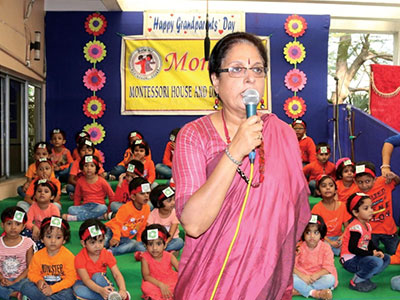 “The Mongrace, New Town team is delighted that our efforts to provide genuine Montessori education have been finally recognised by the country’s most comprehensive, in-depth and authentic preschools survey. We are grateful to our managing trustee Ms. Shanta Ghosh for her encouragement and full support during the pandemic. The resilience of the Mongrace family including teachers, parents and children has enabled us to remain strong and firm in our mission to maintain learning continuity for our children during the Covid-19 disruption. Our teachers have quickly and creatively adapted to the virtual medium as have our parents who have willingly collaborated with us to reinforce learning from home” — Chandrika Ramakrishnan, founder-principal, Mongrace Montessori House, New Town, Kolkata
“The Mongrace, New Town team is delighted that our efforts to provide genuine Montessori education have been finally recognised by the country’s most comprehensive, in-depth and authentic preschools survey. We are grateful to our managing trustee Ms. Shanta Ghosh for her encouragement and full support during the pandemic. The resilience of the Mongrace family including teachers, parents and children has enabled us to remain strong and firm in our mission to maintain learning continuity for our children during the Covid-19 disruption. Our teachers have quickly and creatively adapted to the virtual medium as have our parents who have willingly collaborated with us to reinforce learning from home” — Chandrika Ramakrishnan, founder-principal, Mongrace Montessori House, New Town, Kolkata
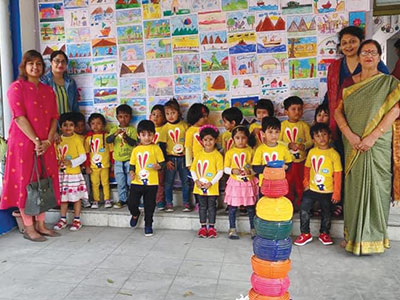 “It’s an honour to be ranked Kolkata’s #1 franchised preschool in the comprehensive EducationWorld rankings. Our steadfast commitment to maintain high-quality early childhood care and education through our experienced teachers, innovative curriculum, child-friendly infrastructure, etc is our greatest strength. This commitment to delivering high-quality ECCE has enabled us to innovate and provide engaging online interactions to our children during the pandemic” — Sanchari Mukherji (left), centre head, EuroKids, CK Block, Salt Lake
“It’s an honour to be ranked Kolkata’s #1 franchised preschool in the comprehensive EducationWorld rankings. Our steadfast commitment to maintain high-quality early childhood care and education through our experienced teachers, innovative curriculum, child-friendly infrastructure, etc is our greatest strength. This commitment to delivering high-quality ECCE has enabled us to innovate and provide engaging online interactions to our children during the pandemic” — Sanchari Mukherji (left), centre head, EuroKids, CK Block, Salt Lake
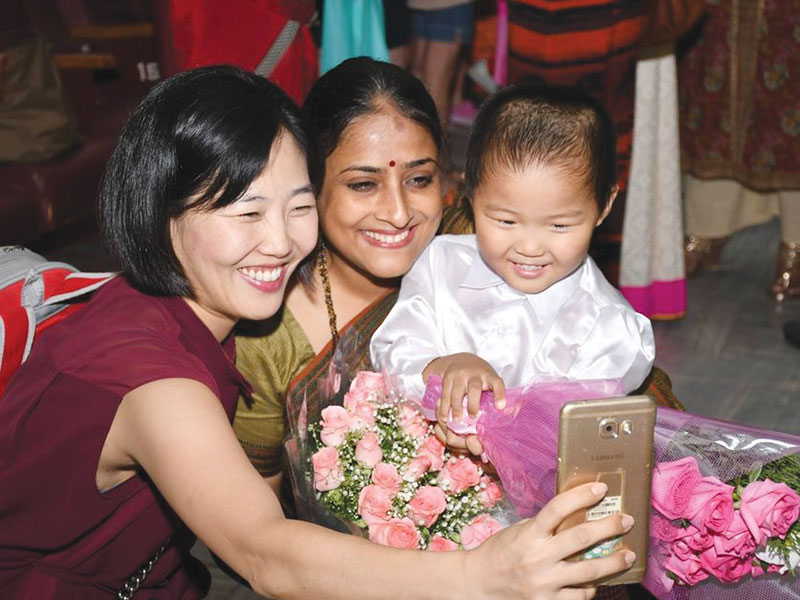 “News that Indus International Primary, Neelankarai has been promoted to #1 position is a sweet surprise in this challenging pandemic year. We sincerely thank your sample respondents for this overdue recognition. I dedicate this award to our teachers who have gone the extra mile over the past few months to provide enriching age-appropriate learning experiences to our children. Our virtual classrooms have become classrooms without borders as our students got opportunities to exchange stories about life while connecting with peers abroad. We have initiated several ‘heal the world’ projects to instil the traits of love, empathy, discipline and respect, in our children” — Lalitha Narayanan, centre head, Indus International Primary School, Neelankarai
“News that Indus International Primary, Neelankarai has been promoted to #1 position is a sweet surprise in this challenging pandemic year. We sincerely thank your sample respondents for this overdue recognition. I dedicate this award to our teachers who have gone the extra mile over the past few months to provide enriching age-appropriate learning experiences to our children. Our virtual classrooms have become classrooms without borders as our students got opportunities to exchange stories about life while connecting with peers abroad. We have initiated several ‘heal the world’ projects to instil the traits of love, empathy, discipline and respect, in our children” — Lalitha Narayanan, centre head, Indus International Primary School, Neelankarai
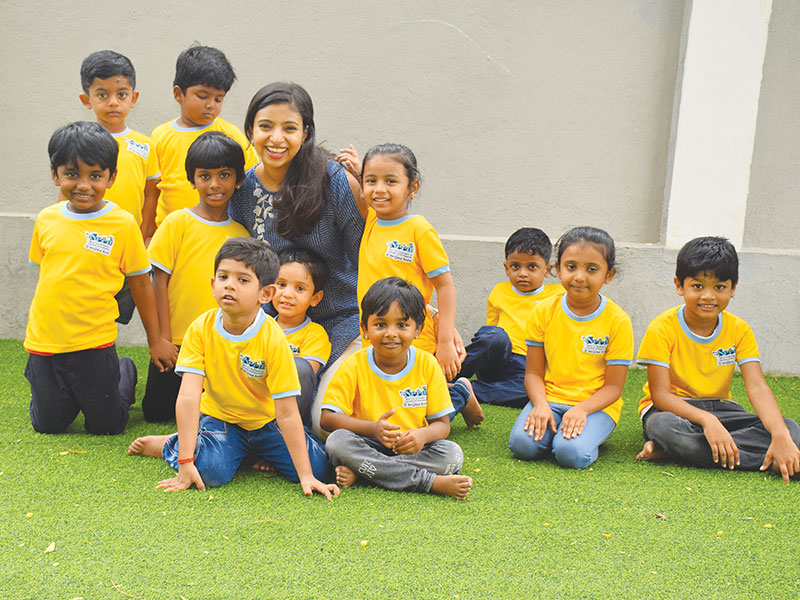 We are very happy and excited that parents and early years educators have ranked SEED, Saligramam Chennai’s #1 franchised preschool for the fourth year in succession. With all schools shut since early March to check the spread of the Covid-19 pandemic, this has been a tough year for us. Nevertheless, we have ensured that our curriculum is continuously updated incorporating the latest research in early childhood education and our teachers are continually trained to provide individualised attention to every child through SEED’s blended learning programme” — Vani Sastri, director of the Seed group of 34 preschools in Tamil Nadu and Karnataka
We are very happy and excited that parents and early years educators have ranked SEED, Saligramam Chennai’s #1 franchised preschool for the fourth year in succession. With all schools shut since early March to check the spread of the Covid-19 pandemic, this has been a tough year for us. Nevertheless, we have ensured that our curriculum is continuously updated incorporating the latest research in early childhood education and our teachers are continually trained to provide individualised attention to every child through SEED’s blended learning programme” — Vani Sastri, director of the Seed group of 34 preschools in Tamil Nadu and Karnataka
 “We are pleasantly surprised to learn that we’ve been voted Bengaluru’s #1 franchised preschool in this pandemic era. For this, credit should be given to our teachers and support staff. They have ensured individual attention and care to all our children. We are also thankful to our new franchise partner FirstCry Intellitots who provided us full support to transition to interactive online teaching-learning which has been greatly appreciated by our parents’ community. However, we are very much looking forward to welcome children back to school” — Priya Dinesh, centre director, FirstCry Intellitots, RMV Extension, Bengaluru (formerly Oi Playschool)
“We are pleasantly surprised to learn that we’ve been voted Bengaluru’s #1 franchised preschool in this pandemic era. For this, credit should be given to our teachers and support staff. They have ensured individual attention and care to all our children. We are also thankful to our new franchise partner FirstCry Intellitots who provided us full support to transition to interactive online teaching-learning which has been greatly appreciated by our parents’ community. However, we are very much looking forward to welcome children back to school” — Priya Dinesh, centre director, FirstCry Intellitots, RMV Extension, Bengaluru (formerly Oi Playschool)
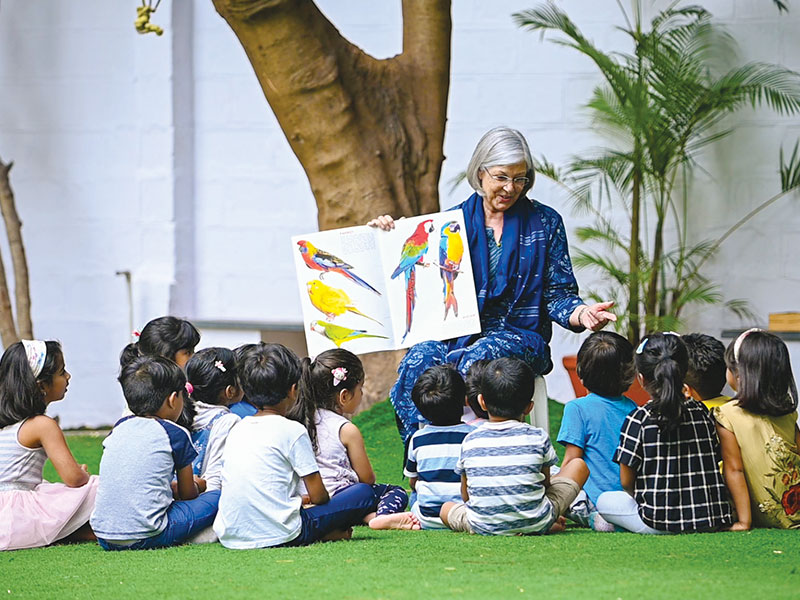 We are delighted to be ranked Bengaluru’s #1 proprietary preschool once again. Over the past three decades, we have been committed to the Montessori pedagogy and have provided a sense of stability and connectedness, regardless of the circumstances, to our parents’ community and our children. It’s this philosophy which has helped us tide over the Covid-19 pandemic crisis. Despite switching to virtual learning, we have been able to provide the essence of Montessori learning material to homes in effective and meaningful ways. The deep personal relationships which Head Start teachers have formed with our children and their families have not been
We are delighted to be ranked Bengaluru’s #1 proprietary preschool once again. Over the past three decades, we have been committed to the Montessori pedagogy and have provided a sense of stability and connectedness, regardless of the circumstances, to our parents’ community and our children. It’s this philosophy which has helped us tide over the Covid-19 pandemic crisis. Despite switching to virtual learning, we have been able to provide the essence of Montessori learning material to homes in effective and meaningful ways. The deep personal relationships which Head Start teachers have formed with our children and their families have not been 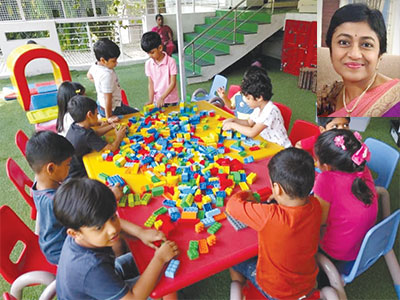 compromised” — Samina Mahmood, founder, Head Start Montessori, Koramangala, Bengaluru
compromised” — Samina Mahmood, founder, Head Start Montessori, Koramangala, Bengaluru
The #1 in Hyderabad ranking has provided us a real sense of achievement during this sad and grim time. Credit for this is due to our teachers and parents who quickly adapted to the demands of online teaching-learning. Most importantly, over the past few months we have helped our youngest children feel emotionally reassured and optimistic about the future by maintaining learning continuity” — K. Kiranmayee, Head of Early Years, Indus International Primary School, Jubilee Hills, Hyderabad
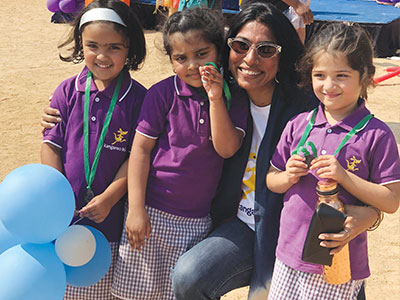 It’s humbling to be ranked Hyderabad’s #1 franchised preschool for the fifth consecutive year. Your sample respondents have endorsed our child-centric early childhood care and education philosophy and also guided us to focus on parameters where we need improvement. Initially when all education institutions were asked to close down, we were hesitant about switching to the online medium because we have always been vocal about the dangers of too much digital screen time for children. But our dedicated teachers have ensured that each child receives personalised attention and mentoring” — Chandrika Chalasani, promoter-principal of Kangaroo Kids, Banjara Hills, Hyderabad
It’s humbling to be ranked Hyderabad’s #1 franchised preschool for the fifth consecutive year. Your sample respondents have endorsed our child-centric early childhood care and education philosophy and also guided us to focus on parameters where we need improvement. Initially when all education institutions were asked to close down, we were hesitant about switching to the online medium because we have always been vocal about the dangers of too much digital screen time for children. But our dedicated teachers have ensured that each child receives personalised attention and mentoring” — Chandrika Chalasani, promoter-principal of Kangaroo Kids, Banjara Hills, Hyderabad
Also read: EW India School Rankings 2020-21 (Part II)





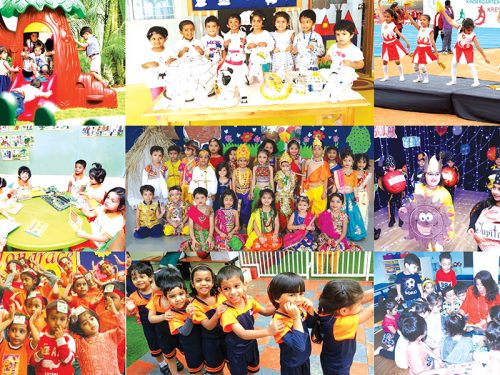











Add comment